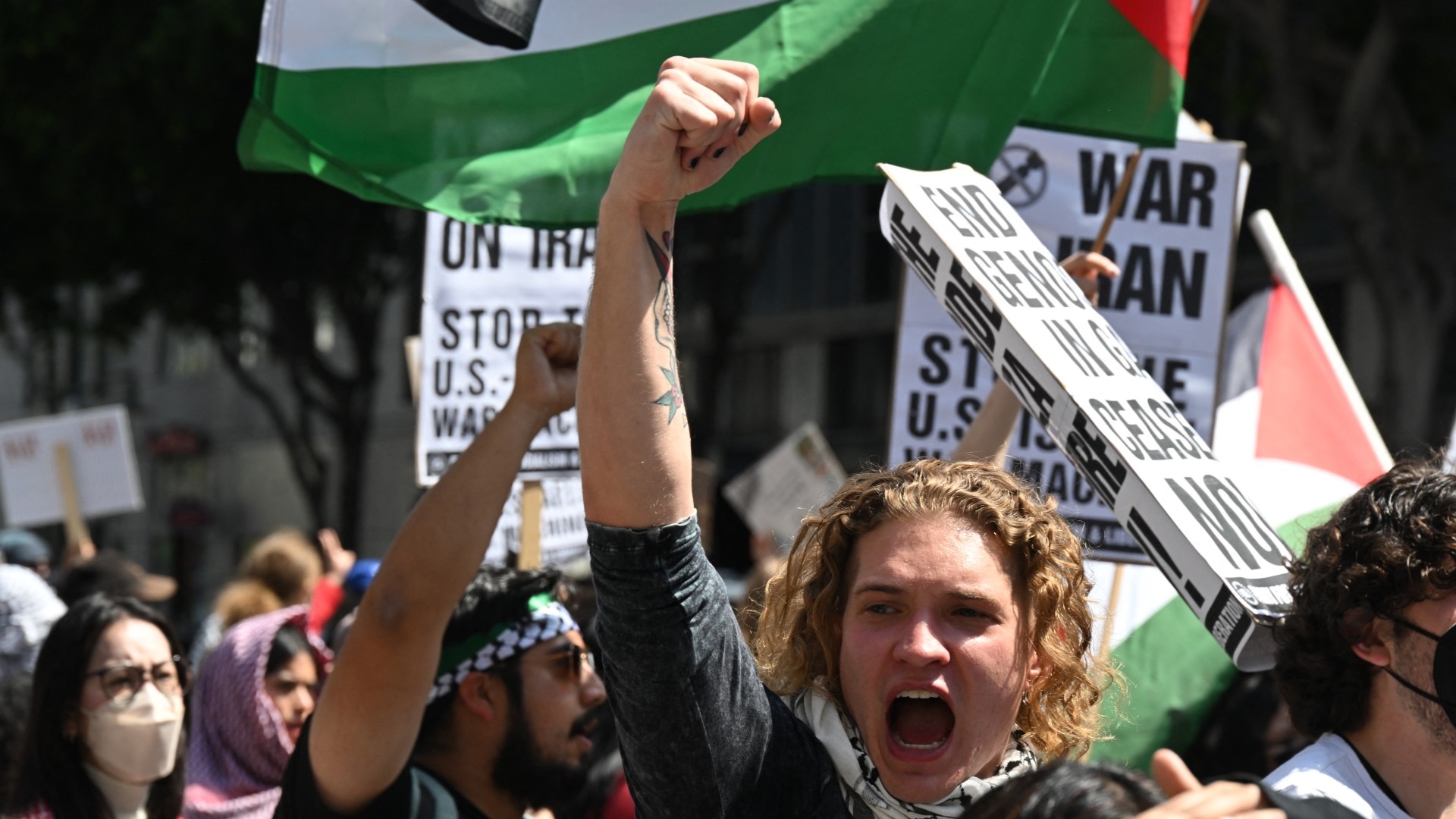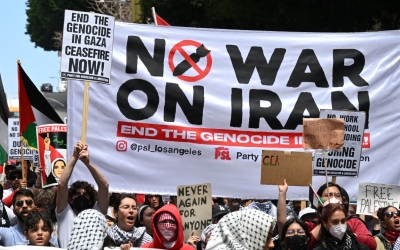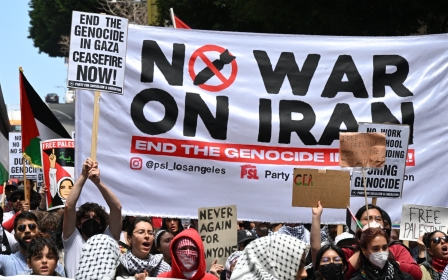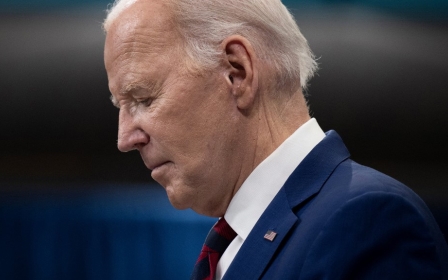The West's unconditional support for Israel is triggering a region-wide war

Events over the past week have brought us one step closer to a region-wide war in the Middle East.
In the early hours of Friday 19 April, Israel carried out military operations against Iran. Explosions were seen and heard in the skies over the cities of Isfahan and Tabriz as Israel’s drones were shot out of the sky. Israeli media reported that targets were also hit in Iraq and Syria. This was Israel’s response to Iran’s 13 April drone and missile attack on Israel. Both sets of attacks resulted in no casualties and no serious damage.
But this is a serious escalation of a situation that is quickly spiralling out of control. How we understand what caused it and which policies are needed to de-escalate it are crucial.
On 1 April, Israel assassinated several of Iran's high-ranking military officials by a drone strike on its embassy compound in Damascus. Any attack on a diplomatic mission is a violation of international law and is regarded as a breach of that country's sovereignty. Still, the UN Security Council failed to condemn Israel's actions.
David Cameron, the British foreign secretary, admitted during an interview with Sky News that the UK would take "strong action" against any country that attacked its consulates.
Such proclamations make it even more astonishing that the UK did not condemn Israel's actions. Instead, the UK issued a statement appearing to justify Israel's breach of international law by referring to Iran's links with Hamas and Hezbollah.
'Double standards'
I have given up crying "double standards" or "hypocrisy" because Britain has a long history of behaving as such in the Middle East, which is why no one there expects anything different.
Soon after its missile attack, Iran stated that it considered the matter to be "concluded", but warned Israel of a larger attack if it retaliates, including strikes on US bases in the region if it backs Israel's actions. Israel has now retaliated so Iran will no doubt be forced to respond.
How much more violence must there be before Israel is forced to accept that Palestinians have the right to self-determination?
How on earth did we get to this point?
I place the blame for this solely on western states that have given unconditional support to Israel and allowed it to act with impunity. Not just in the past six months but in the past 75 years. And not just to Palestinians, but also to its neighbours.
How much more violence must there be before Israel is forced to accept that Palestinians have the right to self-determination and that preventing this from happening is destabilising the whole of the Middle East?
If you think this is a war waged purely by Israel against Palestinians in Gaza before Iran’s actions on 13 April, think again.
Follow Middle East Eye's live coverage of the Israel-Palestine war
On 17 February, Tzachi Hanegbi, Israel's national security adviser, asserted: "We are waging war in seven arenas: Judea and Samaria [Israel's term for the occupied West Bank], Gaza, Lebanon, Syria, Iran, Iraq and Yemen."
Since 7 October, Israel has killed more than 450 Palestinians in the West Bank, arrested over 7,000 others, destroyed infrastructure, and given its heavily armed settlers free rein to attack Palestinians and their property.
In Gaza, Israel's actions are causing immeasurable harm and suffering. Since 7 October, Israel has killed more than 33,000 Palestinians, injured over 76,000 others, displaced 75 percent of Gaza's population, caused $18.5bn in damage to Gaza's infrastructure, and created the conditions for mass starvation.
Many human rights experts and states such as South Africa concluded that Israel is carrying out a genocide against Palestinians in Gaza.
To the north, there is cross-border fighting between Israel and Lebanon. But, again, this is not new. Israel has been carrying out assassinations, invasions, and massacres in Lebanon since 1972. Hezbollah was established, in fact, to resist Israel's 1982 invasion, but few western leaders acknowledge this.
In May 2000, Israel withdrew from southern Lebanon after occupying it for 15 years. But since 7 October, there have been over 4,700 cross-border attacks. During these, Israel has killed over 70 Lebanese civilians and 300 combatants. Hezbollah has killed a dozen Israeli soldiers and five civilians.
Earlier this year, on 2 January, Hamas leader Saleh al-Arouri was assassinated in a drone strike in Beirut, along with six other members of Hamas. In response, Lebanon lodged a formal complaint to the UN Security Council that Israel had violated Lebanon's sovereignty. But just like Israel's violation of Syrian and Iranian sovereignty on 1 April, the UN Security Council remained remarkably silent.
Crossing over to the Gulf, since October, the Houthis in Yemen have been attacking shipping in the Red Sea and the Gulf of Aden, maintaining they will stop if there is a permanent ceasefire in Gaza.
But what has been the response of the US and the UK? To bomb Yemen, one of the poorest countries in the region, already ravaged by years of civil war and bombing by a Saudi-led coalition.
Over in Syria, Israel has repeatedly carried out air strikes, which have escalated in number and scope since 7 October 2023.
De-escalation
Israel cannot blame all this purely on Hamas's attacks on 7 October.
There are clearly other regional dynamics and rivalries to consider, particularly between Saudi Arabia and Iran. I am not so naive to ignore this.
Israel's actions in Gaza have ignited a region already angry from decades of western intervention and double standards
Hezbollah, the Houthis, Hamas, and Syria are regional allies of Iran, yet Saudi Arabia (like Israel) enjoys the support of the United States, so it is hardly out on a limb.
However, these antagonisms are not what is driving the current escalation. Israel's actions in Gaza have ignited a region already angry from decades of western intervention and double standards.
In 2002, the Arab Peace Initiative, which was endorsed by the Arab League and its 22 member states, offered Israel comprehensive peace and normal relations. In exchange, it called on Israel to withdraw entirely from the territories occupied since 1967, to accept an independent Palestinian state in the West Bank and Gaza, and to agree on a just solution for the refugees. This offer has been on the table for over 20 years yet Israel has ignored it.
The threat of a region-wide war is now very real. A permanent ceasefire in Gaza and a strategy to end Israel's apartheid regime over Palestinians is the only way to de-escalate the situation.
The views expressed in this article belong to the author and do not necessarily reflect the editorial policy of Middle East Eye.
This article is available in French on Middle East Eye French edition.
Middle East Eye propose une couverture et une analyse indépendantes et incomparables du Moyen-Orient, de l’Afrique du Nord et d’autres régions du monde. Pour en savoir plus sur la reprise de ce contenu et les frais qui s’appliquent, veuillez remplir ce formulaire [en anglais]. Pour en savoir plus sur MEE, cliquez ici [en anglais].






